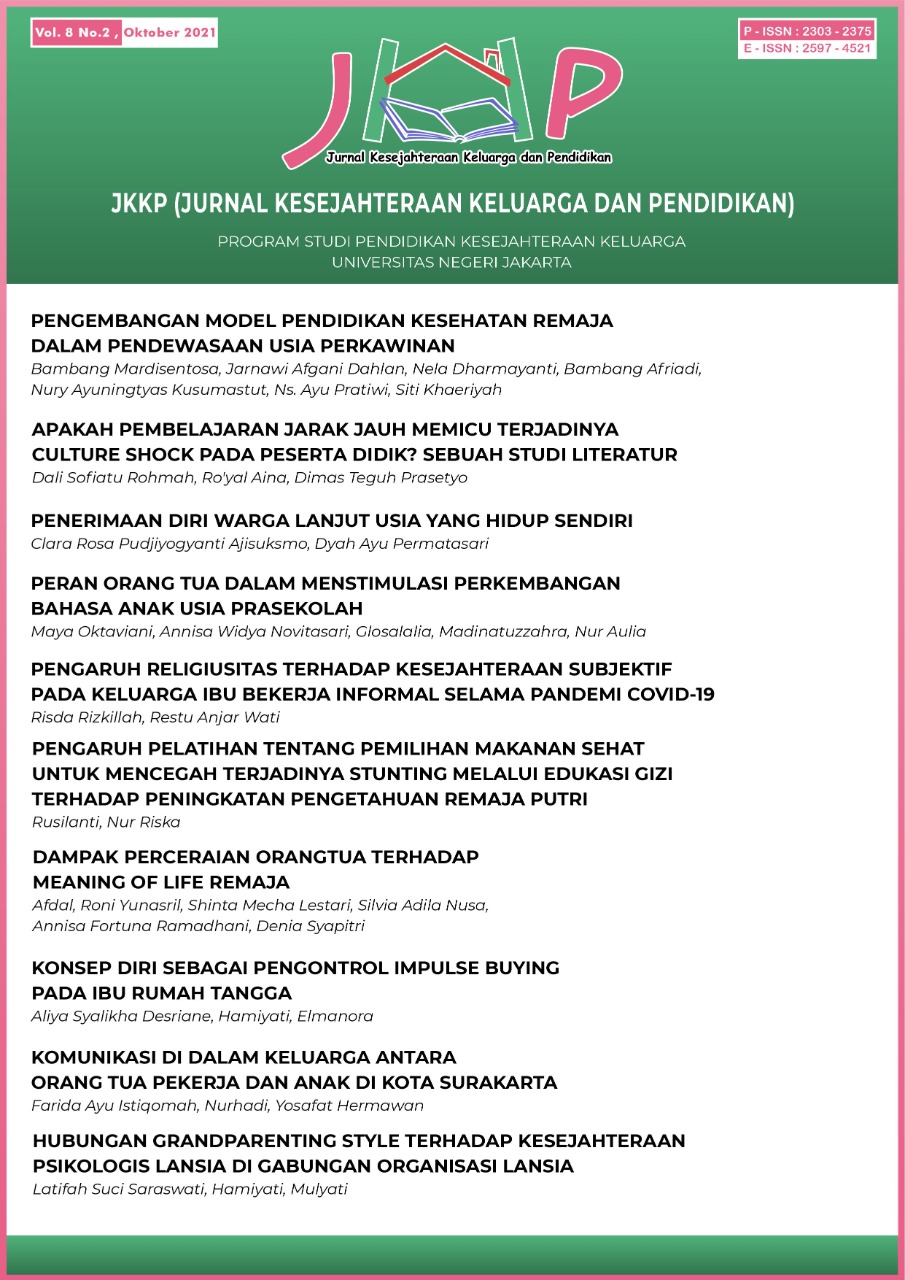APAKAH PEMBELAJARAN JARAK JAUH MEMICU TERJADINYA CULTURE SHOCK PADA PESERTA DIDIK? SEBUAH STUDI LITERATUR
DOI:
https://doi.org/10.21009/JKKP.082.02Keywords:
culture shock, pembelajaran jarak jauh, peserta didikAbstract
The covid-19 pandemic has changed the face of education in Indonesia over the past 2 years. The learning pattern that was originally carried out face-to-face was later changed to distance learning. Distance learning is still a solution in protecting students from exposure to covid-19 in public places. On the other hand, distance learning triggers negative feelings and reduces learning motivation. The phenomenon of culture shock or culture shock is thought to be able to explain students' feelings and experiences during distance learning. This study uses a qualitative approach with analysis of literature studies from various relevant scientific sources. This study was conducted in the period from January to August 2021. The results of the literature review in this study indicate that many students experience culture shock in all levels of education (from students to university students) and cannot be avoided during distance learning. Distance learning, which demands independence, contributes to learning motivation, adjustment, and interaction with the surrounding environment. During the distance learning period, culture shock often triggers a decrease in motivation and negative feelings in the learning process. To be able to reduce the impact that arises due to culture shock, the support of people around is very necessary. The role of parents and teachers is considered capable of keeping students through the culture shock phase during distance learning during the covid-19 pandemic.
Keywords: culture shock, distance learning, students
Abstrak
Pandemi covid-19 telah mengubah wajah pendidikan di Indonesia selama 2 tahun terakhir. Pola pembelajaran yang semula dilakukan secara tatap muka kemudian diubah menjadi pembelajaran jarak jauh. Pembelajaran jarak jauh masih menjadi solusi dalam melindungi peserta didik dari paparan covid-19 di tempat umum. Di sisi lain, pembelajaran jarak jauh memicu perasaan negatif dan mengurangi motivasi belajar. Fenomena culture shock atau gegar budaya diduga mampu menjelaskan perasaan dan pengalaman siswa selama pembelajaran jarak jauh. Penelitian ini menggunakan pendekatan kualitatif dengan analisis studi kepustakaan dari berbagai sumber ilmiah yang relevan. Studi ini dilakukan dalam rentang waktu Januari hingga Agustus 2021. Hasil tinjauan literatur dalam studi ini menunjukkan bahwa culture shock banyak dialami oleh peserta didik di segala rentang pendidikan (mulai dari siswa hingga mahasiswa) dan tidak dapat dihindari selama pembelajaran jarak jauh. Pembelajaran jarak jauh yang menuntut kemandirian ternyata turut berkontribusi pada motivasi belajar, penyesuaian diri, dan interaksi dengan lingkungan sekitar. Selama masa pembelajaran jarak jauh, culture shock banyak memicu penurunan motivasi dan perasaan negatif dalam proses pembelajaran. Untuk mampu mengurangi dampak yang muncul akibat culture shock, dukungan orang sekitar sangatlah diperlukan. Peran orang tua dan pendidik dinilai mampu menjaga peserta didik melalui fase culture shock selama pembelajaran jarak jauh di masa pandemi covid-19.
Downloads
Published
Issue
Section
License
Authors who publish with this Journal agree to the following terms:
- Author retain copyright and grant the journal right of first publication with the work simultaneously licensed under a creative commons attribution licensethat allow others to share the work within an acknowledgement of the work’s authorship and initial publication of this journal.
- Authors are able to enter into separate, additional contractual arrangementfor the non-exclusive distribution of the journal’s published version of the work (e.g. acknowledgement of its initial publication in this journal).
- Authors are permitted and encouraged to post their work online(e.g. in institutional repositories or on their websites) prior to and during the submission process, as it can lead to productive exchanges, as well as earlier and greater citation of published works.
Users/public use of this website will be licensed to CC BY SA
![]()







